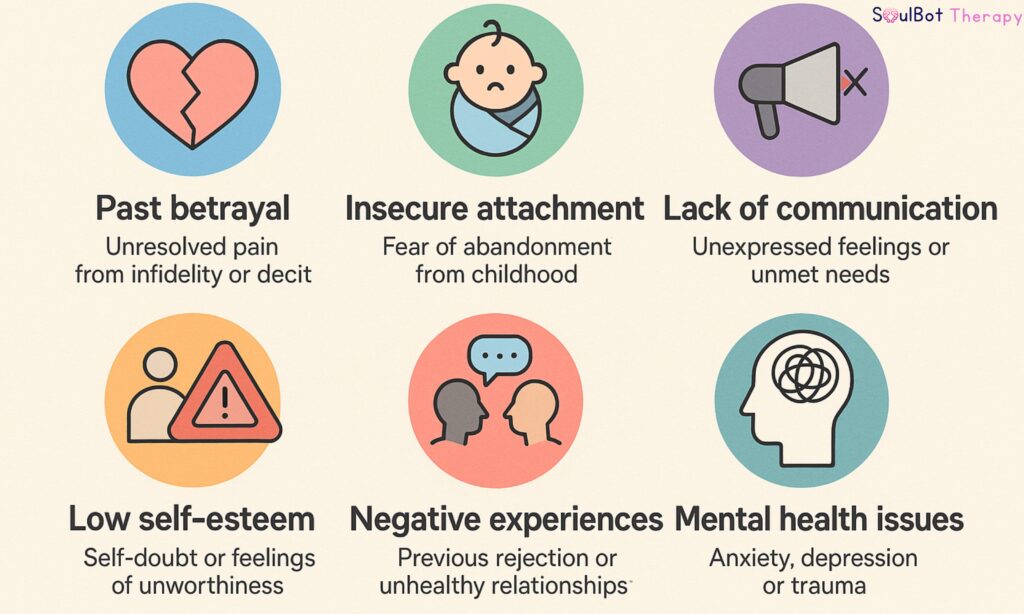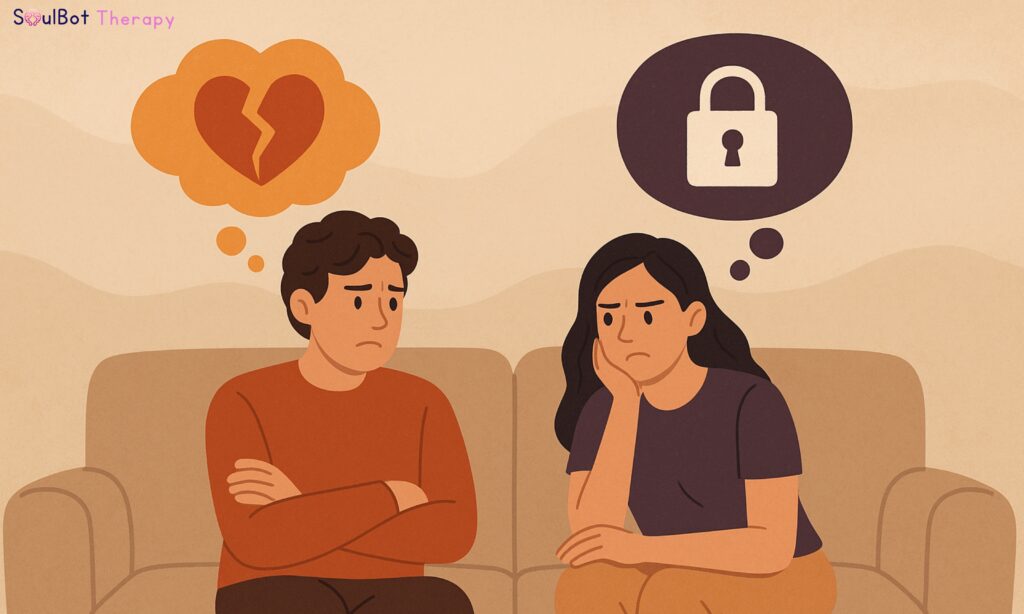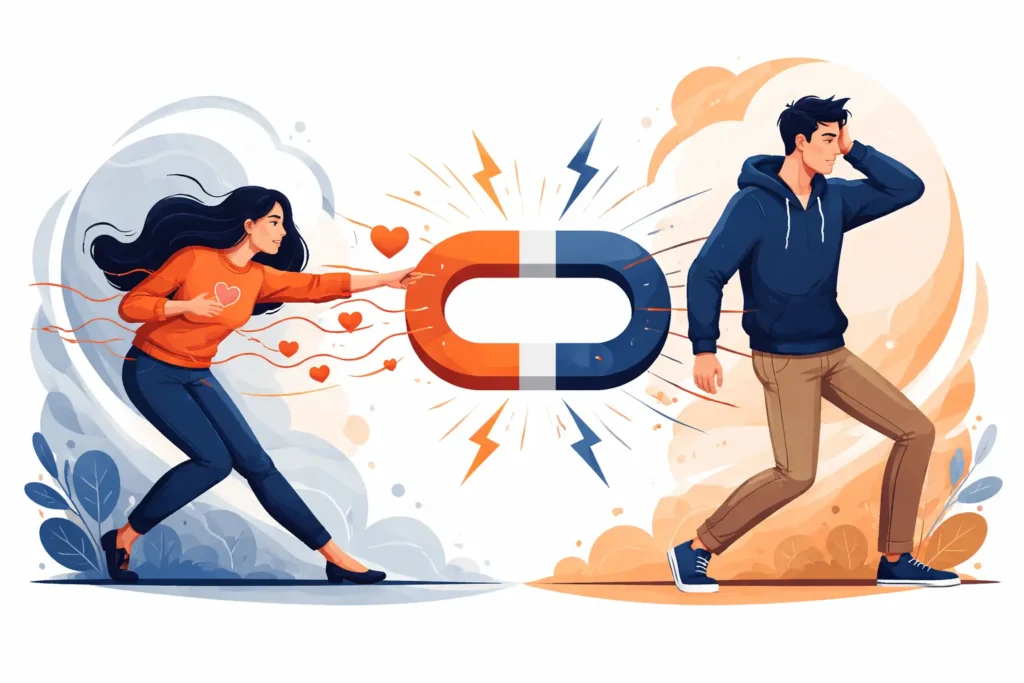Trust issues in relationships aren’t just about jealousy or insecurity they often stem from deep emotional wounds, unmet needs, or even childhood attachment patterns.
If you’re stuck in a cycle of suspicion, fear, or emotional distance, this blog is your safe space to unpack the “why” and start healing with clarity.
💔 What Are Trust Issues in Relationships?
Trust issues in relationships refer to difficulty believing your partner’s intentions, honesty, or commitment, often without clear evidence of betrayal.
It feels like walking on eggshells, expecting disappointment, or never truly relaxing in love.
“I always think they’ll leave or lie even if they never have.”
Sound familiar? That’s a classic sign of trust issues.
🧠 6 Root Causes of Trust Issues
Here’s what might be fueling your doubts:
- Past Betrayals (e.g., cheating, lying, gaslighting)
- Insecure Attachment Style (from childhood or past relationships)
- Low Self-Esteem (“Why would anyone stay with me?”)
- Poor Communication, silence feeds suspicion
- Control or Trauma Issues
- Emotional Neglect, especially when needs were unmet

🕵️ Signs of Trust Issues in a Relationship
- You constantly check your partner’s phone or social media
- You assume the worst when they’re late or quiet
- You withhold emotions, fearing vulnerability
- You overreact to small changes in tone or routine
- You often think: “They’re going to leave eventually.”
If you checked 3+ — this blog is for you.
❤️ Chat anonymously with SoulBot — India’s AI Mental Health Companion
🧠 Featured Fact
📊 According to the American Psychological Association, 40–50% of marriages end in divorce with trust breakdown being a major cause.
🛠️ How to Rebuild Trust in a Relationship?
Yes, healing is possible, but it takes honest work and emotional safety. Here’s how:
1. 🗣️ Communicate Transparently
Don’t just say “I’m fine.” Say what you feel.
Use I-statements: “I feel anxious when I don’t hear from you, not because I don’t trust you, but because I struggle with abandonment.”
2. 👂 Listen Without Defending
Let your partner share how they feel without jumping in to justify.
3. 🧩 Understand Attachment Patterns
Avoidant? Anxious? Secure? These patterns often shape how we trust.
4. 💛 Build Small Wins
- Keep promises
- Celebrate consistency
- Repair quickly after missteps
5. 🌱 Consider Therapy
Sometimes, trust issues stem from deeper wounds — not the partner, but the past.
SoulBot’s AI therapist and human-backed consultation can help.
🧬 What Causes Trust Issues?
🧾 Fact: According to the APA, trust breakdown is a top 3 reason for divorce globally.
Let’s break down the common causes:
| Cause | How It Shows Up |
|---|---|
| Past Betrayal | Lingering hurt from cheating, lies, or abandonment |
| Insecure Attachment | Fear of rejection from childhood or past dynamics |
| Low Self-Esteem | Feeling “not enough” = fearing they’ll leave |
| Poor Communication | Assumptions fill the silence |
| Trauma or Abuse | Emotional wounds shape future expectations |
| Lack of Boundaries | Unclear expectations create friction |
Each couple’s context is unique, but the roots are often emotional, not situational.
🧠 Why Do I Have Trust Issues?
“I’ve never been cheated on, but I still panic if they don’t reply fast.”
This could be tied to:
- Childhood emotional neglect
- Fear of abandonment
- Feeling unworthy of love
You’re not “too much” — you’re protecting yourself the only way you know how.
🧭 AI Therapy & Support for Trust Healing
SoulBot’s AI Mental Health Companion is designed to support you through:
- Emotional processing journaling
- Guided trust-healing prompts
- Private reflection after relationship conflicts
- Orientation tests for emotional needs
💬 Book a Free Consultation with SoulBot’s mental health experts
🧠 Explore our upcoming Relationship Attachment Test
🧠 Final Thought: Rebuilding Trust is a Process, Not a Promise
You don’t heal trust with one apology, you heal it with consistency, honesty, and safety.
Even broken glass can become stained glass if you’re willing to rebuild with care.








